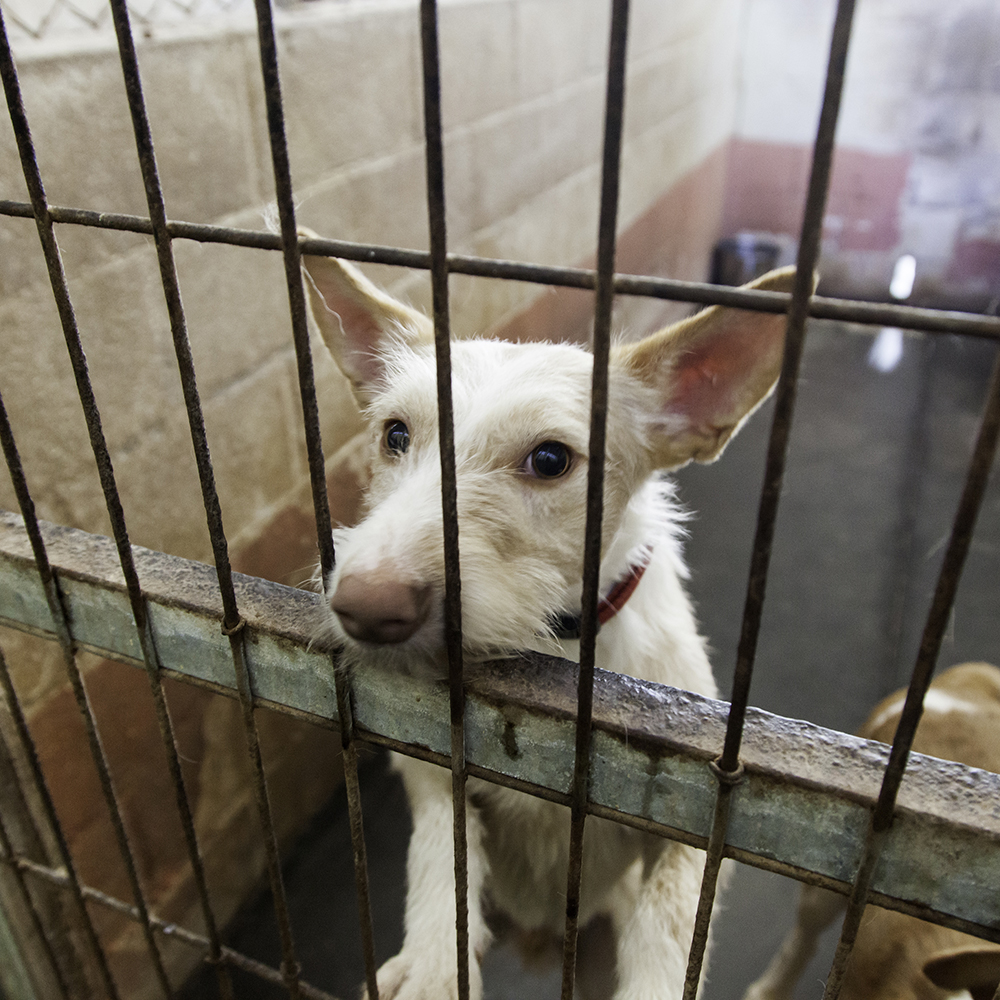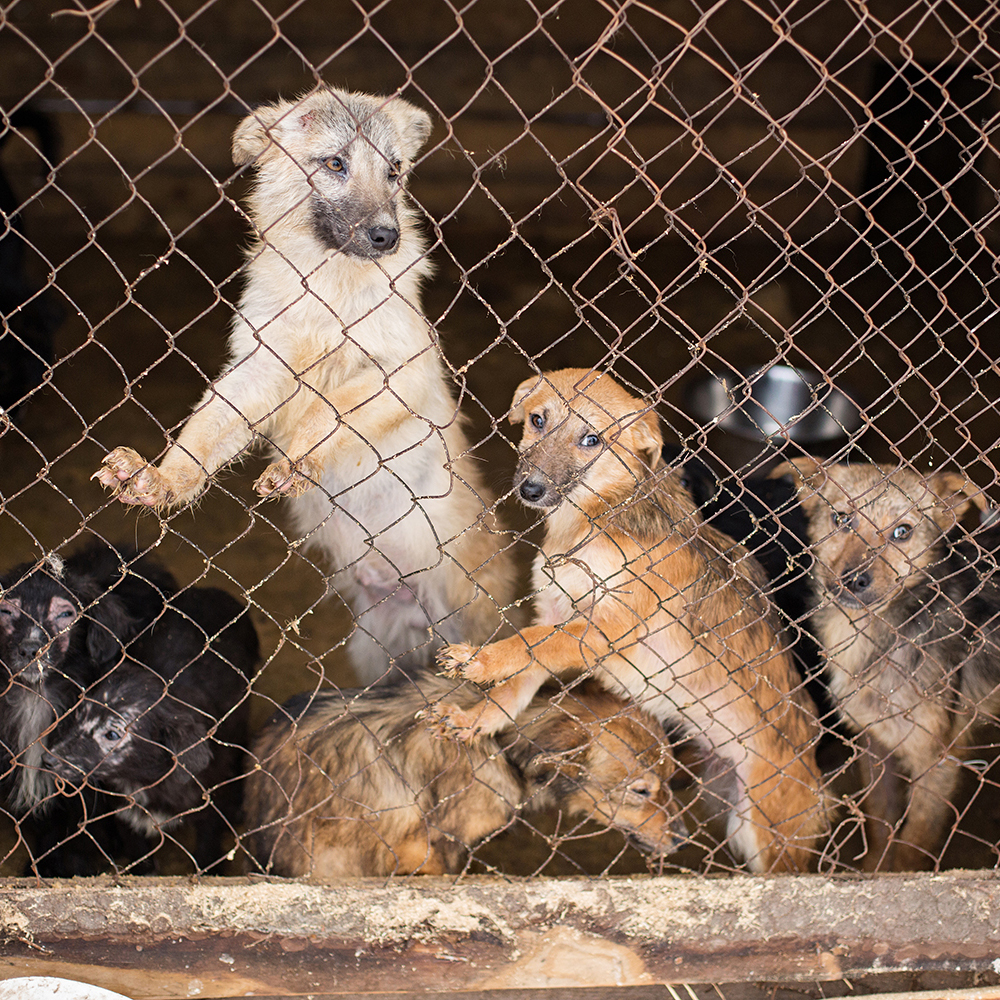It’s Now or Never: Stop Dog Trafficking Now!
By: Patti Strand Date: 07/30/2019 Category: | Animal Legislation | Rescue |
Patti Strand, NAIA president
With your help, 2019 can be the year we finally stop the flood of unhealthy foreign stray dogs pouring into U.S cities. We are at a tipping point in a long and evolving battle. Either we stop it now or we must accept a slow and steady erosion of the health, quality, and type of dogs available to Americans in the future
Retail rescue1 has become the leading animal health and welfare issue of our time. And when this practice is backed by wealthy lobby groups that work to shut down every source of dogs but their own, it threatens the preservation of breeds and a continuing supply of healthy American-bred dogs.
The tipping point: from pet overpopulation to a national pet shortage
 Dog behind bars waiting for a home. Dog behind bars waiting for a home. |
For most of the twentieth century, ending pet overpopulation was a leading animal welfare challenge and the primary reason for the development of private, not-for-profit animal shelters. Over decades of endless effort, these animal shelters, along with government-funded shelters played an irreplaceable role in reducing or ending the euthanasia of adoptable dogs.
In addition to caring for local pets in need, these organizations - private shelters in particular – became the dominant voice for pets in their communities. They understood that their success depended on effective community outreach, so employing people with good marketing, development and communications skills was fundamental. They also did a great job of recruiting celebrity support. From 1979 on, Bob Barker, host of The Price is Right reminded his audience at the close of every show to spay or neuter their pets.
By the late 1980s, most hobby dog breeders were selling pet puppies on spay-neuter contracts, the larger city shelters had initiated spay-neuter programs of their own, and an ever-increasing number of pet owners neutered their dogs.
In 2018, American Pet Products Association reported that 85% of all household dogs in the US were neutered. Today, there are no longer enough dogs being born in the US annually to replace the approximately 8 million dogs that die each year.
As a result of all these remarkable changes, dog overpopulation no longer exists in most parts of the US and today many regions of the country do not have enough dogs to meet demand.
But the fundraising arm of the animal movement didn’t get the memo. Instead of acknowledging the enormity of this achievement and moving on, HSUS and similar animal fundraising groups just switched their target from irresponsible pet owners and oops litters to purposeful breeders and purpose-bred dogs. Soon, anti-breeding legislation mushroomed across the land, each limiting proposal accompanied by sophisticated media campaigns that disparaged breeders as contributing to overpopulation and shelter euthanasia or as owners of cruel breeding operations. As long-time animal rights activist Kim Sturla said in advocating for breeder bans,2 "Our goal is to make the public think of breeding dogs and cats like drunk driving and smoking."
In more recent times, the animal rights movement has morphed its anti-breeder campaign with a consumer-focused campaign to ban pet stores - retail outlets where purebred dogs are sold. To date, over 300 communities have passed retail pet store bans. A huge number of these communities, however, never had a pet store in the first place, a Potemkin Village marketing tactic designed to create a bandwagon effect.
These initiatives – spay/neuter (voluntary and mandatory), breeding bans and pet store bans (or conversions to rescue-only retail outlets) have not only ended the pet overpopulation problem; they have created shortage of dogs in many parts of the country.
Interstate transport rescue and international importation programs
To fill the void, rescues began moving dogs from areas of high supply to areas where shortages exist. But as the US supply of dogs declined, rescues expanded their networks to foreign counties, a phenomenon that has blossomed into a full-blown supply chain. Today, an ever-increasing number of unhealthy and ill-tempered rescue dogs from both national and international rescues pour into our communities, arriving with temperament problems and illnesses that threaten U.S. dogs, livestock and the American public.
 Wanting to help dogs coming from deplorable conditions is a noble goal, but comes with a hidden price for both pets and pet owners. Wanting to help dogs coming from deplorable conditions is a noble goal, but comes with a hidden price for both pets and pet owners. |
Imported dogs are reintroducing diseases and parasites that were previously eliminated in the U.S.3 Dogs imported from South Korea introduced canine flu in 2015, which required the development of a new vaccine4 and more recently a new strain of the distemper virus arrived. Making matters worse, our animal populations have no immunity to many strains of these imported diseases, so disease progression can be fast-moving.
In addition to new and lethal strains of distemper and canine influenza, multiple rescue dogs have been imported carrying canine brucellosis5 and countless vector-borne diseases like ehrlichiosis, babesiosis, and leishmaniasis. These diseases and parasites are becoming common in the destination sites for international rescue dogs.
For example, prior to rescue relocation programs, there were no native cases of heartworm in the Pacific Northwest. Now, due to interstate transport programs dog owners throughout the region must treat their dogs monthly to prevent heartworm infections.6
As the Washington Post recently reported, consumers who purchase sick rescue dogs are affected by the experience in many ways. When 1,300 dogs carrying canine influenza, imported from South Korea and China, ended up in the Chicago area in 2015, dog businesses had to be shut down and dogs had to be quarantined. Some had to be euthanized, leaving behind grieving families who had no idea their rescue pet was already infected with a fatal disease.
The emotional cost wasn't the only price to be paid by these consumers. Dr. Edward Dubovi, a professor at the Animal Health Diagnostic Center at Cornell University, estimated that the cost of the influenza outbreak to dog owners in the Chicago area was between $25 and $75 million.7
Scientists at Cornell have documented a direct cause and effect relationship between rescue dog shipments from Korea and several outbreaks of the H3N2 strain of canine influenza in the U.S. These shipments were facilitated and advertised by the Humane Society International (HSI), an affiliate of the Humane Society of the United States (HSUS),8 organizations that routinely lobby against US dog breeders for their practices.
The National Association of State and Public Health Veterinarians compendium of information on rabies contains this statement: "Canine rabies virus variants have been eliminated from the United States; however, rabid dogs and a rabid cat have been introduced into the continental United States from areas with dog-to-dog rabies transmission. The movement of dogs for the purposes of adoption or sale from areas with dog-to-dog rabies transmission increases the risk of introducing canine-transmitted rabies to areas where it does not currently exist, and this practice should be prohibited."9
The end of pet overpopulation poses an existential threat to animal shelters
In the past, pet shelter operators were often heard to say that they were working hard to put themselves out of business. However, very few have actually closed their doors in celebration of the end of pet overpopulation. Rather than find new ways of supporting responsible dog ownership in the local community, many of these organizations have opted to become aggressive pet retailers, importing rescue dogs from virtually every corner of the world with little, if any understanding of the public health risks posed by such indiscriminate dog trafficking. Worse, hundreds of new rescue and sheltering groups have sprung up to exploit the foreign dog supply.
Developing countries have hundreds of millions of street dogs available for export: If news accounts are correct, Egypt has an estimated 15 million, India, 30 million; and Afghanistan, 100 million, just to name a few. Thousands of dogs have already been imported from South Korea, China and the Middle East. Pipelines are being created to ship more to the US.
In 2006, more than a decade ago, the Centers for Disease Control (CDC) estimated annual dog imports at around 287,000. Today, CDC estimates the number of arrivals to be more than a million a year,10 making the importation of stray dogs very big business for so-called not-for-profit rescues and shelters. Just one example: the rescue group that imported the most recent of three rabid rescue dogs from Egypt to the U.S. had tax-free revenues of $1,110,274 in 2017.11
It seems clear that many retail rescue groups see this as just the beginning. The website of Big Dog Rescue Ranch12 (BDRR) features a photo of the "first phase" of an immense, almost military-looking "campus" being developed to house thousands of dogs. Phase II of the development, for which fundraising already has begun, will include a boarding facility, veterinary clinic and pet supply store.
One hopes that they will focus their efforts on trying to help American pets, but alas, at the end of March, the NBC affiliate in West Palm Beach, Florida, aired a story describing Big Dog Rescue Ranch’s trip to China to rescue 37 dogs from the "meat trade."13 In June, Big Dog Rescue Ranch further exposed its vision by importing another 60 rescue dogs from China.14 It is alarming that news outlets seem oblivious to the downside of such import activities and cover them using the perspective of the importing group. In this case they covered the arrival of the imported dogs at the Big Dog facility enthusiastically and posted the story in the "Good News" section of the station’s website.
Even more troubling, well-known glitterati from both the Republican and Democrat parties have picked up the cause and even served as chairs of the Big Dog Rescue Ranch’s annual fundraisers. We can only hope that these high-profile individuals will modify their support when they realize the damage to animal health and welfare caused by the business model that BDRR is pioneering, which at this point appears based on importing foreign stray dogs.
More regulation is needed
Unfortunately, there is very little regulation to control the importation and resale of these stray dogs. At the federal level, the regulations that exist are strewn among multiple agencies without any one agency having the statutory authority to do what is needed to protect the health of Americans and their animals. As the saying goes, “when everyone is in charge, no one is in charge.” Less than one percent of the 1.06 million dogs estimated to be entering the country by CDC fall under the USDA oversight. Others fall under the purview of the CDC, which focuses on zoonotic diseases.
Once these pets get to the rescue or shelter facility, there is often less oversight. While most retail pet stores have been regulated by state or local ordinances and regulations, not-for-profit pet shelters are largely unregulated. And consumers buying dogs at shelters have little way of knowing where their puppies came from or what kind of health and temperament issues they may have.
The lack of transparency and oversight in the retail rescue pet market has led some to compare it to the "wild west." National animal rights organizations have raised millions of dollars demanding accountability in the for-profit pet retail market but they have been conspicuously silent on the subject of accountability for not-for-profit rescue and shelter operations.
In fact, animal rights groups are systematically positioning these programs as well-motivated, humane efforts to rescue stray dogs otherwise destined for the brutal dog-meat markets of exotic locations around the world. To paraphrase WPTV, it's all "good news."
But the reality is very different. The facts are that these groups are attempting to "mainstream" the unregulated import of foreign stray dogs, no matter their health, physical condition or temperament, in order to maximize their revenues, expand their operations, and fund the expensive lobbying and media relations campaigns that keep them in business.
As a result, the unregulated pet retail market thrives, while regulated breeders, consumers, local animals and public health all decline.
They say that a frog tossed into boiling water will jump out immediately, but one tossed into lukewarm water may get comfy and not detect that the water is gradually rising to a boil.
That's where responsible dog breeders are today. The issue of pet importation has reached the boiling point and it’s now or never if we are to protect our dogs, preserve our breeds and assure a healthy source of dogs for Americans in the future.
The NAIA and NAIA Trust are working with key Congressional offices on bipartisan, federal legislation to regulate dog importation. The House and Senate bill numbers are HR 4239: and S 2597.
- Move dog importation under the purview of APHIS Veterinary Services. Veterinary Services already oversees the importation of other live animals and animal products.
- Ensure that all dogs imported into the U.S. are in good health, are properly vaccinated and are permanently identified. Vaccinations and health testing must be certified by a foreign government-accredited veterinarian before exported to the US.
- Require dogs that are imported for the purpose of transferring ownership or control another to not only meet the specifications above but also be at least six months of age and accompanied by a USDA import permit. This includes dogs imported for sale, adoption, exchange or donation.
- Require all Certificates of Veterinary Inspection for transport in commerce to be sent to USDA for inclusion in a centralized database.
- Provide USDA resources through a certificate fee to fund these initiatives.
What you can do
If you share our concerns and values, we ask you to join our campaign. Sign up below so that we can connect with you when the time is right.
- Subscribe to our mailing list so we can reach you when action is needed on important legislation;
- Volunteer to get active in your state;
- Advertise your events;
- Donate to support our lobbying and educational efforts.
Phone: 503-227-8450
Email: naia@naiaonline.org
Sources:
- The NAIA Shelter Project: http://shelterproject.naiaonline.org/page/glossary
- Pet Sterilization becomes law in San Mateo: https://www.latimes.com/archives/la-xpm-1990-12-19-mn-6411-story.html
- The National Association of State and Public Health Veterinarians, page 509, no. 3
http://www.nasphv.org/Documents/NASPHVRabiesCompendium.pdf - Want to rescue a dog from overseas? It might carry a new strain of disease: https://www.washingtonpost.com/science/2019/03/27/want-rescue-dog-overseas-it-might-carry-new-strain-disease-researchers-say/
- Update: Washington County Humane Society euthanizes dog that tested positive for canine brucellosis:
https://www.cbs58.com/news/two-dogs-rescued-from-south-korea-test-positive-for-canine-brucellosis - Pets and Parasites: http://www.petsandparasites.org/about-capc/press-releases/capc-top-10-cities-list-for-heartworm-disease
- See 4 above
- See 4 above
- See 3 above
- CDC Federal Register document, page 727: https://www.naiaonline.org/uploads/WhitePapers/CDC1-31-2019Rabies-FreeGuidance.pdf
- The IRS 990’s for Unleashed Pet Rescue for 2017: https://projects.propublica.org/nonprofits/organizations/452949268/201813189349306396/IRS990
- Big Dog Ranch Rescue https://bdrr.org
- Big Dog Rescue Ranch flies to China to bring back 37 dogs: https://www.wptv.com/news/region-c-palm-beach-county/loxahatchee-acreage/big-dog-ranch-rescue-team-flies-to-china-rescues-37-dogs-from-dog-meat-trade
- Big Dog Rescue Ranch rescues 60 dogs from China dog meat trade: https://www.abcactionnews.com/news/state/big-dog-ranch-rescues-60-dogs-from-china-dog-meat-trade
About The Author
All Authors Of This Article: | Patti Strand |











